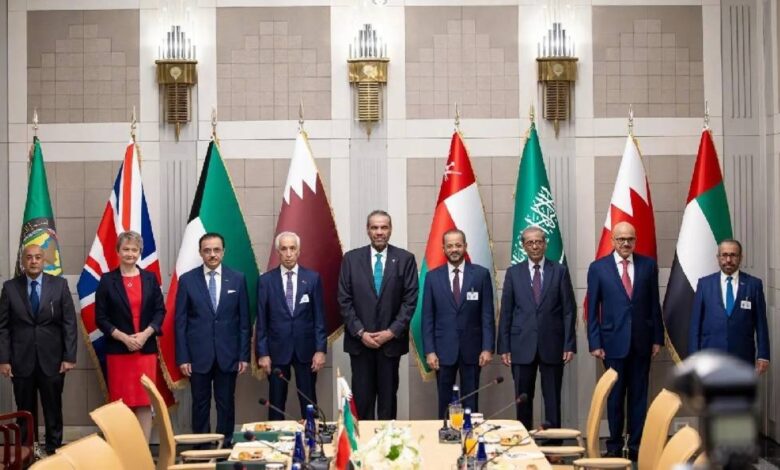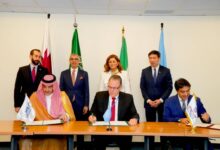
The foreign ministers of the Gulf Cooperation Council countries, the Minister of State for Foreign Affairs, Commonwealth and Development in the United Kingdom, Ivat Cooper, and the Secretary -General of the Cooperation Council for the Arab States of the Gulf Jassem bin Mohammed Al -Badawi, held a meeting in New York today (Wednesday) to discuss regional and global issues, and to enhance coordination in line with the strategic partnership between the Cooperation Council and the United Kingdom, with a focus on promoting peace, security and prosperity.
In a joint statement, the ministers affirmed their commitment to promoting peace and work together to resolve conflicts and address instability, praising the efforts of the Cooperation Council states to end regional conflicts through mediation and dialogue and enhancing mutual understanding.
The meeting welcomed the election of Bahrain as a non-permanent member of the UN Security Council for the period 2026-2027.
The Cooperation Council and the United Kingdom decided to continue working closely together to achieve peace in unstable and affected areas of conflicts, expressing their condemnation of the Israeli attack on Doha on September 9, which was a flagrant violation of the sovereignty of the State of Qatar.
The meeting affirmed their support for Qatar and its territorial integrity, in line with the principles of the United Nations Charter.
In a joint statement, the meeting warned that these measures may hinder the ceasefire negotiations in the Gaza Strip, which is the only way to achieve permanent peace. The ministers expressed their full support for the vital role that Qatar continues to play in mediation efforts between Israel and “Hamas”, along with Egypt and the United States.
The ministers condemned the humanitarian catastrophe in the Gaza Strip and Israeli restrictions on aid, which exacerbated the humanitarian starvation and suffering. The ministers called on all parties to the conflict to comply with their obligations under international humanitarian law, including the protection of civilians and infrastructure.
The ministers praised the success of the high -level international conference on the peaceful settlement of the Palestinian issue and the application of the two -state solution, which was participated in the presidency of the Kingdom of Saudi Arabia and the Republic of France, which was held from 28 to 30 July, and the high -level meeting held on September 22 at the headquarters of the United Nations. The ministers affirmed their support for all efforts to end the war in the Gaza Strip and achieve a fair and sustainable settlement through the implementation of a two -state solution, and to ensure stability and security for all countries of the region. They also affirmed their support for the efforts of the international coalition to implement the two -state solution.
The ministers praised the positive decisions taken by the United Kingdom and other countries of recognition of the State of Palestine, stressing the growing international consensus on the two -state solution.
The ministers stressed the importance of preserving the historical situation of Jerusalem and its sanctities, recognizing the special role of the Hashemite Kingdom of Jordan in this regard, as the ministers affirmed their support for the Palestinian Authority.
The ministers stressed the necessity of a unified rule led by a Palestinian leadership in the Gaza Strip and the West Bank under the supervision of the Palestinian Authority. They renewed their commitment to support the Palestinians’ aspirations in self -determination, and to ensure that the Palestinians are an essential axis in the process of governance, security and recovery in the Gaza Strip after the end of the conflict. In the context of ending the war in Gaza, Hamas must end its rule in Gaza.
He called on the ministers to reduce the escalation in the Middle East, and stressed the necessity of focusing on reaching a permanent ceasefire, leading to permanent end of hostilities, the release of all the kidnappers, the exchange of Palestinian prisoners, the great and continuous expansion in providing life -saving aid to Palestinian civilians, and urged all parties to negotiate in good faith to restore peace and security in the region, and the ministers stressed the importance of supporting the United Nations for relief and employment Palestinian refugees (UNRWA), and its pivotal role in supporting relief efforts and humanitarian and developmental assistance, and ensuring that they continue to perform their duties in a manner that ensures the provision of basic needs of the Palestinian people.
The ministers continued to follow up the issue of the maritime borders between the Republic of Iraq and the State of Kuwait, and they stressed that resolving the outstanding issues between the two neighboring countries in accordance with international law will contribute positively to the stability and cooperation of the region.
The ministers stressed the importance of the sovereignty of the State of Kuwait, the integrity of its lands, and the respect of international agreements and the relevant United Nations resolutions, especially Security Council Resolution 833 regarding the demarcation of the Kuwaiti -Iraqi border.
The ministers urged the demarcation of the maritime borders between Kuwait and Iraq completely after the 162nd mark, according to the United Nations Agreement on the Law of the Law of 1982, and the rules and principles of international law, in line with previous agreements.
The ministers called on the government of Iraq to resolve the internal legal status of the 2012 Kuwait and Iraq Convention to regulate maritime navigation in Khor Abdullah and to ensure that the agreement remains in effect.
The ministers welcomed the approval of the UN Security Council for its decision No. 2792, stressing the responsibility of the Council in ensuring the full implementation of all its states and ensuring justice and accountability, and pointed to the role of the highest representative whose mandate will focus exclusively on strengthening, supporting and facilitating efforts related to the restoration or return of all Kuwaitis and the subjects of other countries or their remains, and the restoration of Kuwaiti property, including the national archive. They urged the utmost efforts to reach a solution to all relevant issues.
On the Syrian issue, the ministers affirmed their commitment to support the Syrian government in making progress towards a comprehensive, representative and non -sectarian political transition that respects the rights of all Syrians, regardless of their ethnic or religious backgrounds. The ministers welcomed the announcement of the Syrian Arab Republic to reach a road map to resolve the crisis in the As -Suwayda Governorate, and praised the efforts made by the Hashemite Kingdom of Jordan and the United States of America in this regard.
The ministers participated in their commitment to support the Syrian government in providing a more stable, freedom and prosperity future. They also renewed the importance of addressing the continuous humanitarian needs and enhancing economic recovery, and stressed the need to implement the agreement between the Syrian government and the Syrian Democratic Forces. The ministers praised the efforts of the Cooperation Council states to enhance economic cooperation and support a Syrian path towards recovery and stability.
With regard to security, the ministers stressed the need for Israel to stop its attacks on the Syrian Arab Republic, which destabilizes Syria’s security and the integrity and integrity of its territory and citizens, and undermine the efforts of the Syrian government to maintain security and stability. The ministers also stressed what was stated in Security Council Resolution 2782 regarding the need for all parties to adhere to the 1974 engagement agreement.
The ministers reaffirmed the importance of reaching a just and sustainable peace in Ukraine, based on respect for sovereignty and territorial integrity, according to the principles of the United Nations Charter. They agreed to intensify efforts to alleviate the global repercussions of the war, including its human, economic and security effects.
The ministers affirmed their joint commitment to define practical paths towards achieving peace. They also welcomed the current efforts led by the United States with the support of partners in the Middle East, such as what the Kingdom of Saudi Arabia is doing, to facilitate dialogue and enhance stability.
The ministers also recognized the importance of humanitarian measures, including facilitating prisoners ’exchanges, and renewed their support for initiatives to alleviate human suffering. The ministers praised the efforts of the Cooperation Council states to contribute to a political solution to the crisis between Russia and Ukraine, its initiatives in mediation, the release of detainees, the exchange of prisoners, and the reunification of children with their families.
The ministers expressed their deep regret over the devastating human suffering in Sudan, and they recalled the efforts made to end the conflict between the warring parties. They welcomed the statement issued by the foreign ministers of the United Arab Emirates, the Kingdom of Saudi Arabia, the Arab Republic of Egypt, and the United States of America on September 12, 2025 regarding the restoration of peace and security in Sudan, and praised the efforts made in this regard, including the London Conference on Sudan in April 2025, and the ministers’ determination to coordinate efforts to end the conflict, ensure humanitarian aid to the needy, and protect civilians. Currently, the Cooperation Council and the United Kingdom called for an immediate ceasefire for humanitarian purposes in the city of El -Fasher, to enable a large -scale aid delivery to Darfur, and to address the urgent humanitarian needs of the Sudanese people who face the risk of starvation.
The ministers agreed that the diplomatic solution is necessary for Iran’s nuclear program, and they stressed that Iran cannot possess a nuclear weapon, and expressed their appreciation for the efforts of the Cooperation Council, especially the Sultanate of Oman, to play the role of mediation between the United States and Iran. The ministers emphasized that the regional escalation does not serve the interest of any party, and renewed their joint commitment to support joint stability in the region. They also condemned the strongest expressions of Iranian strikes on the base of many on June 23.
The ministers stressed the importance of constructive cooperation between Iran and the International Atomic Energy Agency, and the need to intensify diplomatic efforts to ensure the commitment of all parties to the relevant international agreements, which contributes to building confidence and promoting regional and international security and stability.
The ministers renewed their support for the call of the United Arab Emirates to reach a peaceful solution to the conflict on the three islands, Greater Tunb and Lesser and Abu Musa, through bilateral negotiations or the International Court of Justice, in accordance with the rules of international law, including the United Nations Charter.
The Cooperation Council and the United Kingdom confirmed the safety and freedom of maritime navigation in the Red Sea, and the ministers condemned the Houthi attacks that affected the innocent sailors, and threatened the economies of the region and international navigation. They stressed the need to contain the destabilizing acts by the Houthis, and pointed to the ongoing violations of Security Council Resolution 2216, including the continued import and storage of weapons.
The ministers agreed that the political process that leads to a sustainable political settlement is the best solution in the long run for Yemen. The ministers also stressed that the presence of a stable and effective Yemeni government is vital to achieving peace and stability. They called on the region and the international community to provide the necessary support to the Yemeni government.
The ministers have strongly condemned the illegal detention of at least 19 international employees since August 31, calling for the immediate release of them. They expressed their deep concern about the Houthi intimidation of humanitarian workers, especially in light of the exacerbation of food insecurity. With the suffering of 18 million people from acute food insecurity and anticipated conditions, they urged coordinated international measures to prevent a humanitarian catastrophe.
The ministers praised the continuous efforts made by the Kingdom of Saudi Arabia and the Sultanate of Oman in communicating with all Yemeni parties, and stressed the importance of reviving the political process that would lead to a comprehensive and sustainable political solution in Yemen. They stressed the importance of the Houthis’ involvement in international and international efforts as it is very important to end the Yemeni crisis, and to alleviate the suffering of the Yemeni people. The ministers also praised the achievements of the King Salman Center for Relief and Humanitarian Action, and the humanitarian support provided by the Office of Coordination of Humanitarian Affairs and Relief to the Cooperation Council countries for the Arab States of the Gulf of the Republic of Yemen, in addition to the humanitarian and development assistance provided by all the countries of the Council to Yemen.
The Cooperation Council and the United Kingdom emphasized the depth of the growing trade relations, as the volume of bilateral trade exceeded 53 billion pounds ($ 72 billion) in 2024, and the ministers agreed on the importance of promoting trade and investment between the two sides to enhance mutual growth and prosperity.
The Cooperation Council and the United Kingdom also affirmed their commitment to promoting free trade, and the two sides affirmed their commitment to giving priority to conclude the free trade agreement between the Cooperation Council and the United Kingdom, realizing that the conclusion of a feasible trade agreement would enhance trade and investment relations, benefit companies, and support the creation of job opportunities for high competencies in the United Kingdom and the countries of the Cooperation Council.
In conclusion, the ministers affirmed their joint determination to contribute to security, stability and regional prosperity within the framework of the strategic partnership between the Cooperation Council and the United Kingdom, and their mutual intention to build closer relations in all fields, including political, security and economic cooperation.
Related news






